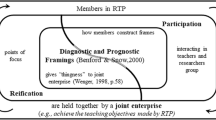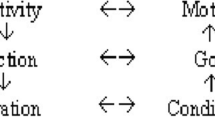Abstract
As an essential community of practice which could facilitate teachers’ professional development and enrich research in teacher education, the teacher–researcher partnership (TRP) has not been sufficiently investigated in China. As reported in this paper, we conducted an empirical study on TRPs between secondary school mathematics teachers and university researchers by applying activity theory to investigate their collaboration and contradictions, through the process of co-designing lesson studies. We found four levels of contradictions, namely, primary, secondary, tertiary, and quaternary, within which the fourth one occurs less frequently compared to the other three. To ameliorate or even resolve the contradictions, it requires both sides to (1) achieve agreement on understanding the objects, (2) promote equality in communication and mutual respect, (3) facilitate transformation in identity, and (4) construct a united community. In addition, the investigation provided a depiction of how teachers learn and grow in the TRP as well as how teachers and researchers interact in the partnership, which in turn enriches both teacher education and activity theory.

Similar content being viewed by others
References
Baten, E., Praet, M., & Desoete, A. (2017). The relevance and efficacy of metacognition for instructional design in the domain of mathematics. ZDM Mathematics Education, 49, 613–623. https://doi.org/10.1007/s11858-017-0851-y
Beveridge, L., Mockler, N., & Gore, J. (2018). An Australian view of the academic partner role in schools. Educational Action Research, 26(1), 25–41. https://doi.org/10.1080/09650792.2017.1290538
Boaler, J. (2008). Bridging the gap between research and practice: International examples of success. In M. Menghini, F. Furinghetti, L. Giacardi, & F. Arzarello (Eds.), The first century of the International Commission of Mathematical Instruction. Proprieta artistic e letteraria Riservata.
Brooker, R., & McPherson, I. (1999). Communicating the processes and outcomes of practitioner research: An opportunity for self-indulgence or a serious professional responsibility? Educational Action Research, 7(2), 207–221. https://doi.org/10.1080/09650799900200091
Cai, J., Morris, A., Hohensee, C., Hwang, S., & Hiebert, J. (2018). Reconceptualizing the roles of researchers and teachers to bring research closer to teaching. Journal for Research in Mathematics Education, 49(5), 514–520. https://doi.org/10.5951/jresematheduc.49.5.0514
Cai, J., Morris, A., Hohensee, C., Hwang, S., Robison, V., & Hiebert, J. (2017). A future vision of mathematics education research: Blurring the boundaries of research and practice to address teachers’ problems. Journal for Research in Mathematics Education, 48(5), 466–473. https://doi.org/10.5951/jresematheduc.48.5.0466
Charmaz, K. (2006). Constructing grounded theory: A practical guide through qualitative analysis. Sage Publications.
Chen, X. (2020). Teacher learning in boundary-crossing lesson study. Journal of Educational Studies, 16(02), 47–58. In Chinese.
Coburn, C. E., Penuel, W. R., & Geil, K. (2013). Research-practice partnerships: A strategy for leveraging research for educational improvement in school districts. William T. Grant Foundation.
Dey, I. (1999). Grounding grounded theory: Guidelines for qualitative inquiry. Emerald Group Publishing.
Du, J., & Chang, H. (2020). Return the value of teachers’ professional learning community. Educational Research, 41(05), 126–134. In Chinese.
Engeström, Y. (1999). Innovative learning in work teams: Analyzing cycles of knowledge creation in practice. In Y. Engeström, R. Miettinen, & R.-L. Punamäki (Eds.), Perspectives on activity theory (pp. 377–406). Cambridge University Press.
Engeström, Y. (2001). Expansive learning at work: Toward an activity theoretical reconceptualization. Journal of Education and Work, 14(1), 133–156. https://doi.org/10.1080/13639080020028747
Engeström, Y. (2015). Learning by expanding: An activity-theoretical approach to developmental research (2nd ed.). Cambridge University Press. https://doi.org/10.1017/CBO9781139814744
Engeström, Y., & Sannino, A. (2010). Studies of expansive learning: foundations, findings and future challenges. Educational Research Review, 5(1), 1–24. https://doi.org/10.1016/j.edurev.2009.12.002
Farrell, C. C., Harrison, C., & Coburn, C. E. (2019). “What the hell is this, and who the hell are you?” Role and identity negotiation in research-practice partnerships. AERA Open, 5(2), 1–13. https://doi.org/10.1177/2332858419849595
Foot, K., & Groleau, C. (2011). Contradictions, transitions, and materiality in organizing processes: An activity theory perspective. First Monday. https://doi.org/10.5210/fm.v16i6.3479
Fujii, T. (2016). Designing and adapting tasks lesson planning: A critical process of Lesson Study. ZDM Mathematics Education, 48, 411–423. https://doi.org/10.1007/s11858-016-0770-3
Goodchild, S. (2014). Mathematics teaching development: Learning from developmental research in Norway. ZDM - Mathematics Education, 46, 305–316. https://doi.org/10.1007/s11858-013-0567-6
Greany, T., Gu, Q., Handscomb, G., Varley, M., Manners, P., & Duncan, S. (2014). School-university partnerships: Fulfilling the potential summary report. Research Council UK. Retrieved 30 March, 2015 from https://www.ioe.ac.uk/about/documents/School_University_Partnerships_Fulfilling_the_Potential.pdf.
Gu, F., & Gu, L. (2016). Characterizing mathematics teaching research specialists’ mentoring in the context of Chinese lesson study. ZDM Mathematics Education, 48, 441–454. https://doi.org/10.1007/s11858-016-0756-1
Henrick, E. C., Cobb, P., Penuel, W. R., Jackson, K., & Clark, T. (2017). Assessing research-practice partnerships: Five dimensions of effectiveness. William T. Grant Foundation.
Horn, I. S. (2005). Learning on the job: A situated account of teacher learning in high school mathematics departments. Cognition and Instruction, 23(2), 207–236.
Huang, R., Fang, Y., & Chen, X. (2017). Chinese lesson study: A deliberate practice, a research methodology, and an improvement science. International Journal for Lesson and Learning Studies, 6(4), 270–282.
Huang, X., Lai, M., & Huang, R. (2021). International journal for lesson and learning studies (pp. 2046–8253). Emerald Publishing Limited. https://doi.org/10.1108/IJLLS-09-2020-0076
Jordan, B., & Henderson, A. (1995). Interaction analysis: Foundations and practice. Journal of the Learning Sciences, 4(1), 39–103. https://doi.org/10.1207/s15327809jls0401_2
Juuti, K., Lavonen, J., Salonen, V., Salmela-Aro, K., & Krajcik, J. (2021). A teacher–researcher partnership for professional learning: Co-designing project-based learning units to increase student engagement in science classes. Journal of Science Teacher Education, 32(6), 1–17.
Ketterlin-Geller, L. R., Baumer, P., & Lichon, K. (2015). Administrators as advocates for teacher collaboration. Intervention in School and Clinic, 51(1), 51–57.
Koichu, B., & Pinto, A. (2018). Developing education research competencies in mathematics teachers through trail: Teacher–researcher alliance for investigating learning. Canadian Journal of Science Mathematics and Technology Education, 18, 68–85. https://doi.org/10.1007/s42330-018-0006-3
Lerman, S. (2000). The social turn in mathematics education research. In J. Boaler (Ed.), Multiple perspectives in mathematics teaching and learning (pp. 19–44). Greenwood Publishing Group.
Lo, M. L., & Marton, F. (2012). Towards a science of the art of teaching: Using variation theory as a guiding principle of pedagogical design. International Journal of Lesson and Learning Studies, 1(1), 7–22.
McDonald, T., Thornley, C., Fitzpatrick, R., Elia, A., Stevens, S., Teulilo, G., et al. (2008). Developing teacher–researcher partnerships to investigate best practices: Literacy learning and teaching in content areas of the secondary school. Teaching & Learning Research Initiative.
Meng, F. (2016). Harmonious coexistence: Theory and practice of teacher education community. Capital Normal University Press. in Chinese.
Ministry of Education, People’s Republic of China. (2012). Mathematics curriculum standard for compulsory education (2011 version). Beijing Normal University Press.
Ministry of Education, People’s Republic of China. (2017). Mathematics curriculum standard of general high schools (2017 version). People’s Education Press.
Penuel, W. R., & Debarger, A. H. (2016). A Research-practice partnership to improve formative classroom assessment in science. In A. J. Daly & K. S. Finnigan (Eds.), Thinking and acting systemically (p. 97). American Educational Research Association. https://doi.org/10.3102/978-0-935302-46-2_4
Potari, D., Psycharis, G., Sakonidis, C., & Zachariades, T. (2019). Collaborative design of a reform-oriented mathematics curriculum: Contradictions and boundaries across teaching, research, and policy. Educational Studies in Mathematics, 102, 417–434.
Pothen, B., & Murata, A. (2006). Developing reflective practitioners: A case study of pre-service elementary mathematics teachers' lesson study. In J. V. S. Alatore (Eds.), Proceedings of the 28th Annual Meeting of the North American Chapter of the International Group for the Psychology of Mathematics Education (Vol. 2, pp. 824–826). Merida, Mexico.
Sirotnik, K., & Goodlad, J. (Eds.). (1998). School-university partnerships in action: Concepts, cases, and concerns. Teachers College Press.
Slavit, D., Kennedy, A., Lean, Z., Nelson, T. H., & Deuel, A. (2011). Support for professional collaboration in secondary school mathematics: A complex web. Teacher Education Quarterly, 38(3), 113–131.
Stigler, J. W., & Hiebert, J. (1999). The teaching gap: Best ideas from the world’s teachers for improving education in the classroom. Journal of Curriculum Studies, 32(6), 867–874.
Stouraitis, K., Potari, D., & Skott, J. (2017). Contradictions, dialectical oppositions and shifts in teaching mathematics. Educational Studies in Mathematics, 95, 203–217. https://doi.org/10.1007/s10649-017-9749-4
Tseng, V. (2012). Social policy report: The uses of research in policy and practice. Sharing Child and Youth Development Knowledge, 26(2), 1–24. https://doi.org/10.1002/j.2379-3988.2012.tb00071.x
Vescio, V., Ross, D., & Adams, A. (2008). A review of research on the impact of professional learning communities on teaching practice and student learning. Teaching and Teacher Education, 24(1), 80–91. https://doi.org/10.1016/j.tate.2007.01.004
Wagner, J. (1995). Research universities, schools of education, and the schools: A case study of implementing cooperative research and extension in education. Educational Policy, 9(1), 24–53. https://doi.org/10.1177/0895904895009001002
Wagner, J. (1997). The unavoidable intervention of educational research: A framework for reconsidering researcher-practitioner cooperation. Educational Researcher, 26(7), 13–22.
Wang, J. Y., & Cheng, L. (2011). U-S cooperation and diversified pattern construction theory research: And the Fifth Cross-Strait Four Places’ Academic Seminar of “School Improvement and Partnership.” Research on Education Development, 33(20), 39–43. in Chinese.
Wenger, E. (1998). Communities of practice: Learning, meaning, and identity. Cambridge University Press. https://doi.org/10.1017/CBO9780511803932
Wenger, E., McDermott, R., & Snyder, W. (2002). Cultivating communities of practice: A guide to managing knowledge. Harvard Business School Press.
Winter, R. (1989). Learning from experience: Principles and practice inaction-research. Falmer.
Zhu, H., & Zhang, J. (2013). Practical research on school-university cooperative community of teacher education in China: Review and future vision. Research in Teaching, 36(05), 15–19. in Chinese.
Acknowledgements
We would like to extend our deepest gratitude to Dr. Jinfa Cai for providing valuable and insightful comments, and for being encouraging and supportive, at various points throughout the process of writing this paper.
Funding
This study was funded by the International Joint Research Project of Huiyan International College, Faculty of Education, Beijing Normal University. The authors have no relevant financial or non-financial interests to disclose.
Author information
Authors and Affiliations
Corresponding author
Ethics declarations
Conflict of interest
The authors have no competing interests to declare that are relevant to the content of this article. All authors certify that they have no affiliations with or involvement in any organization or entity with any financial interest or non-financial interest in the subject matter or materials discussed in this manuscript. The authors have no financial or proprietary interests in any material discussed in this article.
Additional information
Publisher's Note
Springer Nature remains neutral with regard to jurisdictional claims in published maps and institutional affiliations.
Supplementary Information
Below is the link to the electronic supplementary material.
Rights and permissions
About this article
Cite this article
Qi, C., Liu, X., Wang, R. et al. Contradiction and its solutions in the mathematics teacher–researcher partnership: an activity theory perspective. ZDM Mathematics Education 54, 639–652 (2022). https://doi.org/10.1007/s11858-022-01358-2
Accepted:
Published:
Issue Date:
DOI: https://doi.org/10.1007/s11858-022-01358-2




